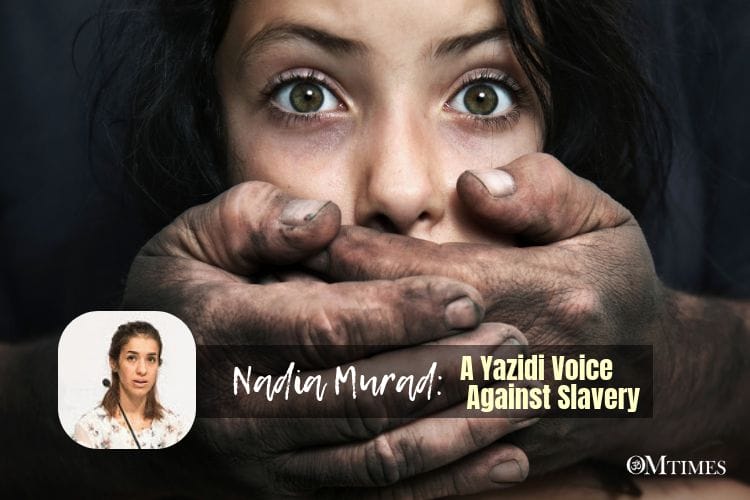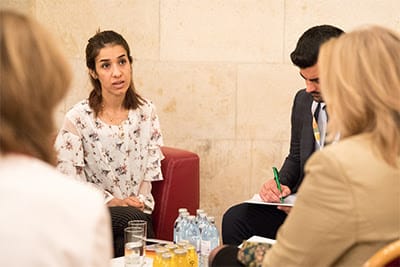Nadia Murad: A Yazidi Voice Against Slavery

Nadia Murad, a Yazidi victim of ISIS turned champion of victimized women is a winner of the 2018 Noble Peace Prize.
Nadia Murad: A Yazidi Beacon of Light Against Slavery
Nadia Murad, now a United Nation Goodwill Ambassador on Trafficking of Persons, is the co-laureate of the 2018 Nobel Peace Prize. In 2014  when she was 21, she and her neighbors in a predominantly Yazidi village in the Simjar mountainous area of Iraq were attacked by the forces of the Islamic State of Iraq and Syria (ISIS). These forces were following a pattern of targeted killings, forced conversions to Islam, abductions, trafficking of women, sexual abuse and slavery. In Murad’s village, most of the older men were killed, the younger men were taken to be soldiers in the ISIS forces, and the women were taken into slavery, primarily as sex slaves, in Mosul, the city which served as the headquarters of ISIS.
when she was 21, she and her neighbors in a predominantly Yazidi village in the Simjar mountainous area of Iraq were attacked by the forces of the Islamic State of Iraq and Syria (ISIS). These forces were following a pattern of targeted killings, forced conversions to Islam, abductions, trafficking of women, sexual abuse and slavery. In Murad’s village, most of the older men were killed, the younger men were taken to be soldiers in the ISIS forces, and the women were taken into slavery, primarily as sex slaves, in Mosul, the city which served as the headquarters of ISIS.
There were some 500,000 Yazidi in Iraq through Iraqi demographic statistics are not fully reliable. Yazidi leaders may give larger estimates by counting Kurds who had been Yazidis but had converted to Islam. There had been some 200,000 Yazidis among the Kurds in Turkey but now nearly all have migrated to Western Europe, Australia, and Canada. Many of the Yazidi are ethnic Kurds and the government of Sadam Hussein was opposed to them not so much for their religious beliefs but because some Yazidi played important roles in the Kurdish community seen as largely opposed to his government.
After a time in Mosul, Nadia Murad, with the help of a compassionate Muslim family, was able to escape Mosul and make her way to the Iraqi Kurdistan area where many Yazidis from the Sinjar area had already arrived. Once there she joined a newly created association of Yazidi women who had organized to defend their rights and so that the voices of women could be heard. A few of these women were able to be resettled in Western Europe. Nadia Murad was able to live in Germany where she became the spokesperson for Yazidi women and other women who had met a similar fate. In December 2015, she addressed the U.N. Security Council and became the public face both for the Yazidi women and for an even larger number of women victims of the fighting in Iraq and Syria.
The structure of the Yazidi worldview is Zoroastrian, a faith born in Persia proclaiming that two great cosmic forces, that of light and good, and that of darkness and evil, are in constant battle. Man is called upon to help light overcome darkness. However, the strict dualistic thinking of Zoroastrianism was modified by another Persian prophet, Mani of Ctesiphon in the third century CE. Mani tried to create a synthesis of religious teachings that were increasingly coming into contact through trade: Buddhism and Hinduism from India, Jewish and Christian thought, Gnostic philosophy from Egypt and Greece, as well as many smaller traditional and “animist” beliefs. He kept the Zoroastrian dualism as the most easily understood intellectual framework, though giving it a more Taoist (yin/yang) character. Mani had traveled in China. He developed the idea of the progression of the soul by individual effort through reincarnation – the main feature of Indian thought.
Within the Mani-Zoroastrian framework, the Yazidi added the presence of angels who are to help humans in their constant battle for light and good. The main angel is Melek Tavis, the peacock angel. Although there are angels in Islam, angels that one does not know could well be demons, so the Yazidi are regularly accused of being “demon worshipers” (1).
While it is dangerous to fall into a good/evil analysis of world politics, there is little to see of “good” in the iSIS actions. Thus Nadia Murad can be seen as a bringer of light into a dark time.
Note (1) A Yazidi website has been set up by Iraqis living in Lincoln, Nebraska, USA. The website is uneven but of interest as self-presentation: www.yeziditruth.org (Yazidi is sometimes written as Yezidi)
Also Read>>>Media silence as gang rape survivor from northern Iraq wins Nobel Peace Prize
About the Author

Rene Wadlow is the President of the Association of World Citizens, located in Geneva, Switzerland.
![]()
Rene Wadlow is the President of the Association of World Citizens, located in Geneva, Switzerland.





